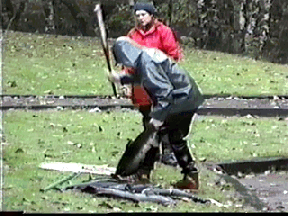
Salmon Recovery, Oregon Style

Judge Lets Envirocrats Run Wild
As I write these words, the Oregon Department of Fish and Wildlife (ODFW) has just won the right to club salmon to death with baseball bats to promote salmon recovery. Beginning in 1997, ODFW implemented a program to kill off a hatchery run of coastal coho salmon in Fall Creek, a tributary of the Alsea River. The theory is that the Fall Creek coho, descended from wild ancestors in the Creek, now threaten to destroy the precious genetic purity of the scarcer wild fish.
When local citizens finally realized what was going on, they banded together in the Alsea River Alliance and filed a lawsuit to seek an injunction against the slaughter. They think that trying to rebuild coho salmon runs from a tiny fraction of the available gene pool lacks any basis in science. Conservation biologists are fond of asserting that each and every run of salmon contains unique and invaluable genetic material which must be preserved. While this is probably not true, the Alsea River Alliance pointed out that the hatchery run was an earlier returning run than the wild run, and, under Oregon law, should have been preserved pursuant to the State goal to protect genetic diversity. No one can give a coherent explanation of why letting 2,000 hatchery fish loose to spawn in the Alsea River would kill off the couple hundred wild ones left. (The Alliance did not challenge a decision to close the hatchery.)
Unfortunately, conservation biology is a political movement, not a scientific one, and hatchery fish are politically-incorrect, because they aren't wild. So protecting genetic diversity is really about protecting politically-correct genes, just as the Constitution's grant of equal rights under law is now construed to grant special (and unequal) rights to politically-correct groups.
On November 11, 1999, Oregon Circuit Court Judge Robert J. Huckleberry refused to grant an injunction against the slaughter. It is probably unfair to single him out, because his approach to the problem of junk science in salmon recovery is entirely typical. Under the new judicial paradigm, courts do not exist to protect citizens from foolish salmon recovery decisions that lack any basis in science. So long as the Government can declare that the matter is in dispute, it wins.
So the ODFW biologist got up and told the Court little more than "hatchery fish bad, wild fish good", and the retired geneticist testifying for the Alsea River Alliance testified as to why these these particular hatchery fish constitute a unique genetic component to the gene pool for the Alsea watershed, and how killing all these fish off can only postpone, for decades, any real coho salmon recovery in the Alsea basin. This is what routinely passes for "debate" in salmon recovery: fatuous generalizations from the Government, easily refuted by empirical data.
But Judge Huckleberry was not about to judge the facts. According to him, "somewhat ironically, it is the presence of the debate that creates the evidentiary conflict that makes impossible the granting of the motion pending before the Court". In other words, so long as the two sides don't agree, the Government can do whatever it wants (what do we have judges for?).
The Alsea River Alliance also argued, quite apart from the facts, that ODFW lacked legal authority under State law to exterminate thousands of fish. Under questioning by Pacific Legal Foundation attorney John Groen, representing the Alliance, the principal ODFW witness admitted that no authority existed in ODFW's formal Alsea River Plan for killing off hatchery coho salmon; the witness claimed that ODFW was operating under other laws. Judge Huckleberry thus called a 15 minute recess to the hearing and told attorneys for ODFW to find a law giving them such authority. The attorneys for the Department returned, unable to identify any such law.
Judge Huckleberry's opinion, however, declares that "a host of legislative enactments . . . give the defendants plenty of authority to do exactly that which they want to do at Fall Creek." He singled out and quoted one in particular: "It is the policy of the State of Oregon that food fish shall be managed to provide the optimum economic, commercial, recreational, and aesthetic benefits for present and future generations of the citizens of this State. . ." According to Judge Huckleberry, "[t]he policy is not rigid, and must make room for possibilities just such as that facing the hatchery coho now returning to the Alsea River Basin"--extermination.
Again, we shouldn't blame Judge Huckleberry, because this approach to interpreting "law" is typical. The Legislature is unwilling to do more than skim the surface of controversial issues and avoids making hard choices (what do we have legislators for?). Instead of passing laws, they turn the State's agencies loose to do whatever they want. When wild fish zealots take over the agencies, they "manage to provide the optimum economic, commercial, recreational, and aesthetic benefits" by elevating the "aesthetic benefits" of pure wild salmon over all other goals. As far as they are concerned, if one or two people come and look for a few wild fish over the next twenty years, that is optimal, as compared to having thousands of people fishing for coho.
Once again, don't look to law or science to bring about salmon recovery. Only politics can do it, the kind of politics that "throws the rascals out" and gets some people with the courage to make radical changes, first in the legislatures, then in the agencies, and maybe, eventually, in the courts.
James L. Buchal, November 17, 1999
Links: www.pacificlegal.org; video footage of hatchery slaughter (contains commercial content); e-mail from Native Fish Society with response
Return to Other Salmon Materials
Text © 1999 James L. Buchal; photo © 1999 Ron Yechout; unlike the coho, readers have permission granted to reproduce text freely so long as credit is given.